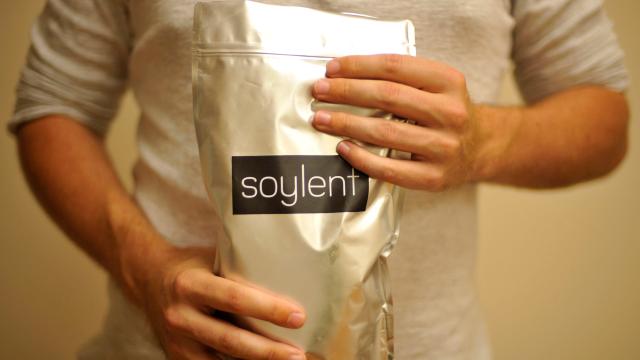We finally know why Soylent Food Bars were making people sick.
Image: Getty
The food startup believes an algae-based ingredient unique to two new products was to blame for the sickness outbreak among its customers, according to a new Bloomberg report. In addition to acknowledging that it found the faulty ingredient, the company announced plans to release new meal replacement bars early next year and said, “Our new formulations will no longer contain algal flour.”
The screwup began all the way back in September, when Soylent released a product called Food Bars that it claimed offered “the same complete nutrition” as its previous products but in a “lighter, more portable form”. There were only two major hangups with the company’s claim. One, scientists agreed that Soylent didn’t offer complete nutrition, and two, Food Bars were making people vomit and giving them uncontrollable diarrhoea. The company halted sales of its Food Bars with a specific ingredient it believed was making customers sick.
Ahead of the algae announcement, Soylent had already confirmed that its products were making people sick. In a blog post two months after the Food Bars launched, the company admitted it “noticed that a handful of consumers (less than 0.1 per cent) who consumed Powder 1.6 over the past several months reported stomach-related symptoms that are consistent with what our Bar customers described”. Now, the company is blaming the entire ordeal on an algal powder used in the bars.
The algae-based ingredients were provided by a company called TerrVia, which also supplies ingredients to companies like Unilever for lotions and soaps. TerraVia told Bloomberg that the algal flour is safe – denying allegations made by Solyent – and also said Soylent products contain other irritants like soy protein isolate and glycerin that can cause similar symptoms.
“Our algal flour has been used in more than 20 million servings of products, and we are aware of very few adverse reactions. In no cases was algal flour identified as the cause,” TerraVia senior vice president Mark Brooks told Bloomberg.
The algal powder sold by TerrVia is commonly used as a vegan replacement for butter and eggs and has been featured in protein bars before such as Honey Stinger bars, which also caused nausea and vomiting for some customers. The algal powder is derived from algae that is grown in a tank, then dried so it turns into a powdery substance that can be used as an alternative to soy in food products. It’s an easy way for companies to use plant-based protein rather than something more costly like meat.
Although Soylent is replacing this faulty ingredient, it still doesn’t explain the company’s outrageous claims about providing “complete nutrition” to anyone who consumes its products. As Gizmodo’s Eve Peyser recently reported, Soylent is marketed as a meal replacement, but the US government classifies the product as a dietary supplement, meaning it’s regulated differently than food. This allowed Soylent to sell faulty products in the first place because as the FDA’s website says, the government agency “is not authorised to review dietary supplement products for safety and effectiveness before they are marketed”.
People who have experienced sickness after eating or drinking a Soylent product can still report it to the FDA here. But even if you haven’t experienced any issues, you still have to ask yourself whether you trust a startup that is blatantly misleading customers about the nutritional value of its products and has already sold food bars that make people puke. In a pinch, Soylent might be good enough to tide you over, but we’d be sceptical of any claims about providing “complete nutrition” in the future.
